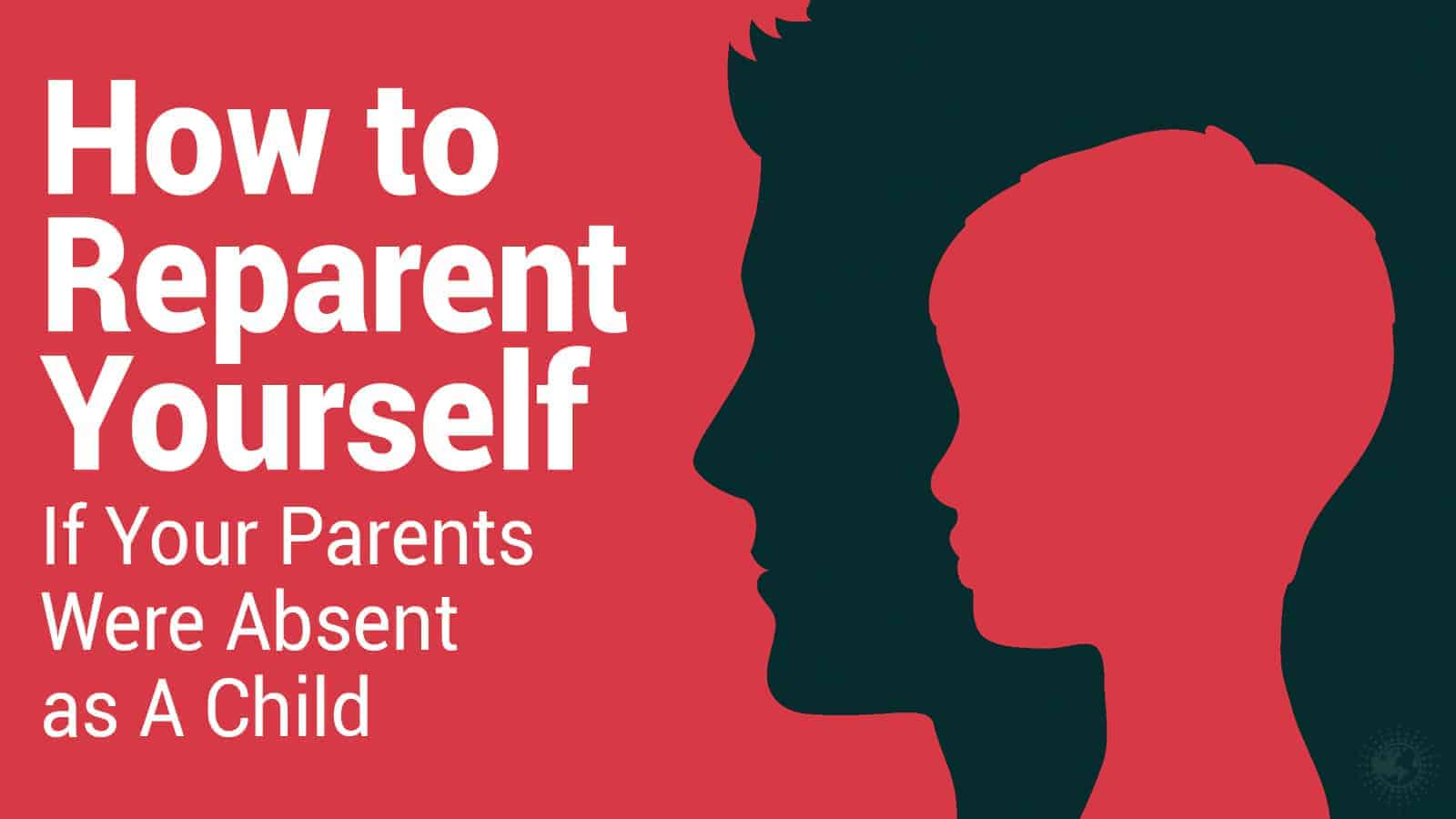If you grew up with an absent parent, you likely already know it causes issues for you as an adult. Without parents to guide you and help you develop, you might have missed out on many essential life skills. Luckily, you can reparent yourself and develop the skills that will help you through life.
Reparenting is when you teach yourself the things you didn’t learn from your parents. Some parents don’t realize that their children need more than just food, clothes, and shelter. When they don’t know or care, then they fail to teach their child social-emotional skills.
Parents should teach their children to set limits for themselves, regulate their emotions, self-soothe, and treat themselves with kindness and respect. They should also set examples of unconditional love, healthy relationships, and how to overcome issues. If your parents didn’t teach you these things, then you will likely struggle with them well into your adult years.
If you are in this position, you can begin to reparent yourself and develop the necessary skills. Learning these skills will help you in your personal and professional life.
Fourteen Signs You Might Need to Reparent Yourself
Before you can learn to reparent yourself, you must know which skills might have been missed in your childhood. Knowing the areas that you should focus on can help you get on the right track to develop these skills.
Figure out what you need and what you didn’t learn as a child. Think about which emotional needs weren’t met by your parents. Some of the areas you might want to focus on include:
1 – Communication Skills
Adults should know how to express themselves. If you can’t do that, then this is a skill you should focus on teaching yourself.
You will notice a lack of communication skills if you aren’t able to resolve conflicts directly. One sign of this problem is the use of passive-aggressive behavior.
Communication skills are essential for both professional and personal life. Without it, you might be stuck in the same position at your job, or your relationships could suffer. Communication is key when it comes to moving forward and bettering your life.
2 – Self-Care Skills
Parents are supposed to teach their children to recognize their needs and fulfill them. Absent parents don’t always do this, though, leaving you lacking in that area. You deserve to take care of yourself and find comfort in life because your needs matter, too.
3 – Being Aware of Your Feelings and Accepting Them
You must be aware of your feelings if you want to understand and accept them. Otherwise, you will constantly feel like you don’t know what is going on with you.
4 – Emotional Regulation
Not only should you be aware of your feelings, but you also must know how to manage them. Absent parents often miss teaching their children to calm and comfort themselves in a positive way. They likely didn’t teach you to respond positively instead of over or under-reacting in an emotional situation, either.
With emotional regulation, you can handle unpleasant emotions with positive coping skills. You will know when and how to respond to certain situations and keep your emotions under control. Without emotional regulation, though, you can become caught in a cycle of negativity.
5 – Self-Validation
Your feelings and decisions are valid, and you can confidently reassure yourself of that with self-validation. Knowing that you and your feelings matter and that you have done everything you can is enough. Unfortunately, if you had absent parents, you might struggle with this skill.
6 – Developing and Enforcing Boundaries
Respect and trust in relationships are essential. You must speak up and make your expectation and boundaries clear. Then, enforce those boundaries by surrounding yourself with people that respect you.
7 – Maintaining Healthy Relationships
Another skill that you might have missed if you had absent parents is how to maintain healthy relationships. You must also know how to recognize unhealthy relationships and end them right away.
8 – Self-Discipline
Knowing when to cut back on unhealthy activities is something every child should learn. If your parents were absent, you might have missed learning about creating healthy habits that benefit your life. The habits could be as simple as going to bed on time or limiting the amount of junk food you consume.
9 – Self-Compassion
Treating yourself kindly is something that is usually learned during childhood. Instead of beating yourself up when you’ve made a mistake, you should allow yourself room to learn and grow.
10 – Accountability
If you take responsibility for your actions and apologize when necessary, you have likely already learned this skill. Otherwise, you may have missed it, but you can reparent yourself to learn accountability. Another sign that you need to develop this skill is if you struggle to follow through on commitments.
11 – Resiliency
Learning to overcome obstacles is something most people learn as a child. Believing in yourself and having faith in your abilities is also a part of being resilient.
12 – Accepting That You Won’t Always Get Your Way
Most children learn that they don’t always get what they want, and they learn to accept it. If this is something you struggle with as an adult, you likely need to reparent yourself. It would be best if you were mature as you handle upsetting situations and avoid throwing a fit.
13 – Love and Respect
Parents should teach their children to love and respect themselves, but absent parents often don’t do this. With self-respect, you can set boundaries and speak up for yourself.
Likewise, parents should teach their children to love and respect others, too. You should know to accept differing opinions and beliefs and avoid forcing your beliefs on others.
14 – Self-Confidence
Children should learn self-confidence, but if you didn’t, you could still teach yourself. With confidence, you can take steps to reach your goals rather than being afraid to get started. You will know that failure is only a learning opportunity and that you can try again.
Ten Ways to Reparent Yourself
Now that you know what to work on, are you ready to do this important work?
1 – Spend Time Learning
The most important step in reparenting yourself is to learn all that you can. Determine which areas you need to work on, and then start researching those topics. You can find self-help articles, books, and podcasts on any of the skills you might need.
2 – Find People You Can Look Up To
Observing others is one of the best ways you can learn and develop your skills. Choose people that are good at these things so that you can have a positive example. They should foster healthy relationships and manage their emotions well.
Choosing the right person can make your reparenting journey so much easier. If you can, go a step further than observation and ask them for tips.
3 – Go to Therapy
Therapists have formal education and training for dealing with these issues. They are experts at social-emotional skills, and they can help you determine your problem areas. The best part about therapy is that it offers a safe, comfortable space to try out your new skills.
4 – Practice
You can’t expect to develop these skills overnight. Instead, make it a goal to practice your targeted skills each day. Don’t get discouraged if it doesn’t happen right away because everything takes time.
5 – Avoid Perfectionist Behavior
You will get discouraged if you expect to master these skills perfectly. Even the people that are great at these skills struggle sometimes. Give yourself grace and compassion, even on your bad days.
6 – Write in a Journal
As you learn to reparent yourself, keep a journal of your journey. Write about the things you have learned and spend time self-reflecting, as well. When you write your thoughts out, it is easier to understand them and grow.
7 – Pay Attention to Your Thoughts
Part of reparenting yourself includes keeping your thoughts in check. If you notice that your self-talk is turning negative, refocus your thoughts on positivity. Focusing on your thoughts and shifting them when necessary can help you make better decisions and practice better self-love.
8 – Practice Self-Care
Taking care of yourself is essential when you are working to develop these skills. Take care of your physical and mental health, and focus on being kind to yourself all of the time. Set aside time for self-care each day, even when you feel like you don’t have time.
9 – Use Positive Affirmations
Positive affirmations can help with anything you are going through in life. Use them each morning to start the day on the right path and to keep your mindset where it needs to be.
10 – Let Go of Your Shame
When you are a child, you can’t control the way your life is. Many adults blame themselves for the things that happened during their childhood and feel shame looking back on situations they couldn’t do anything about. If you experience those feelings, let go of them because you carry a burden that isn’t yours.
Final Thoughts on How to Reparent Yourself If Your Parents Were Absent as A Child
Now that you know the things you must teach yourself, you can focus on learning these skills. As you reparent yourself, try a few different methods so you can have the most beneficial experience.
By reparenting yourself, you are improving your life in many ways. Your mental health will improve, and your personal and professional relationships will strengthen. Give yourself everything you deserve in life by teaching yourself these essential life skills.



















